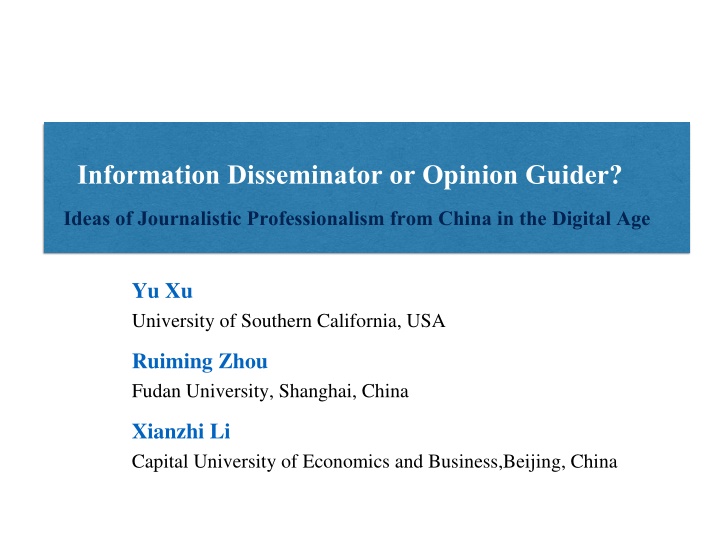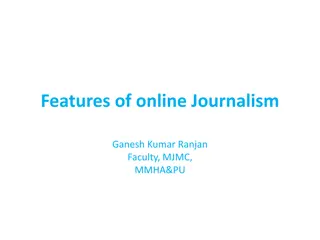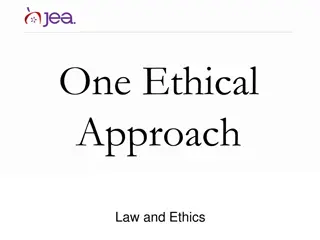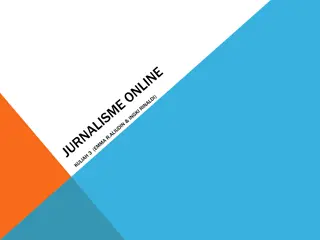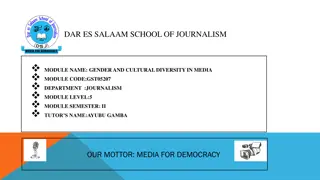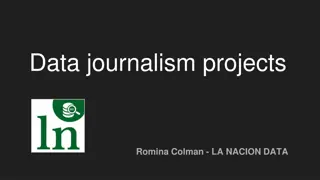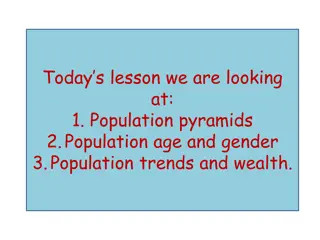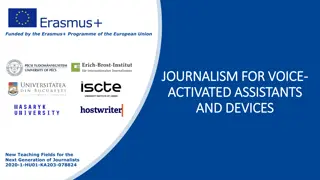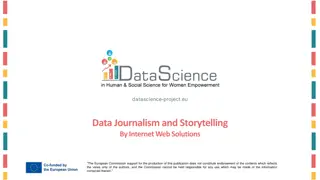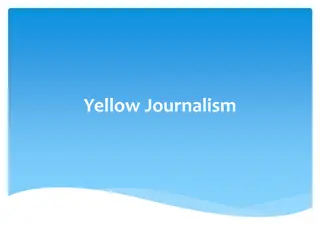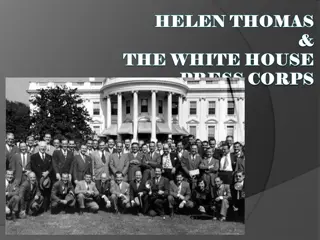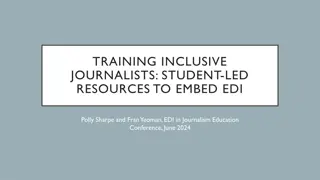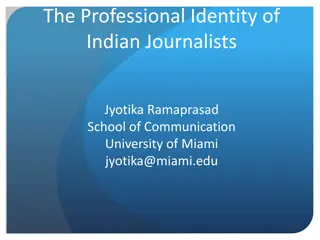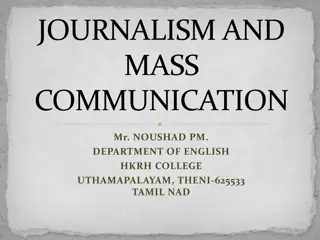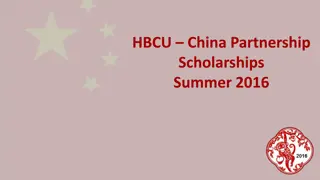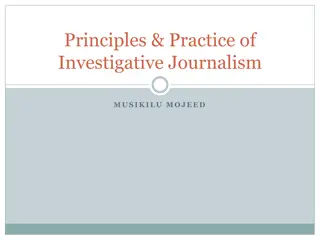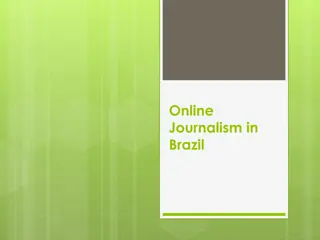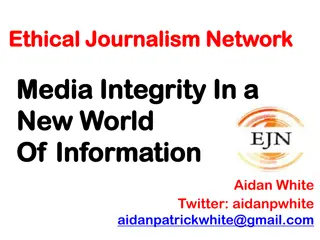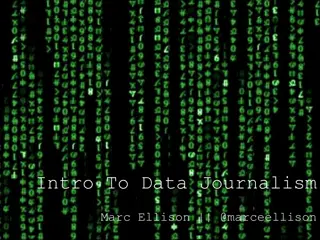Evolving Landscape of Journalism in China's Digital Age
Exploring the changing dynamics of journalism in China's digital era, this study delves into the role of journalists and media models in disseminating information and guiding public opinion. It assesses the social functions of journalism in major cities, analyzing the perspectives of 146 journalists from different media platforms. The research highlights the transition from traditional to new media practices and the evolving professionalism within the field.
Download Presentation

Please find below an Image/Link to download the presentation.
The content on the website is provided AS IS for your information and personal use only. It may not be sold, licensed, or shared on other websites without obtaining consent from the author.If you encounter any issues during the download, it is possible that the publisher has removed the file from their server.
You are allowed to download the files provided on this website for personal or commercial use, subject to the condition that they are used lawfully. All files are the property of their respective owners.
The content on the website is provided AS IS for your information and personal use only. It may not be sold, licensed, or shared on other websites without obtaining consent from the author.
E N D
Presentation Transcript
Information Disseminator or Opinion Guider? Ideas of Journalistic Professionalism from China in the Digital Age Yu Xu University of Southern California, USA Ruiming Zhou Fudan University, Shanghai, China Xianzhi Li Capital University of Economics and Business,Beijing, China
New Media Ecology in China Media Commercialization and Capitalization Propaganda Model and Market Model Provide Information Guide Public Opinions Digital Communication New Players in Media Arena Strategies change of traditional media News Processing
Revisit Journalistic Professionalism Two Objectives Detect the social profiles, functions of journalism, roles of journalists, and ideas of professionalism Examine the differences between journalist from perspectives of organizational forms and geographic factors Method Face-to-face interviews with 146 journalists 4 cities: Beijing, Shanghai, Guangzhou, Wuhan State-owned news media, news websites or grass-root media From March 2014 to January 2015
Beijing Shanghai Wuhan Guangzhou
Quick Facts about 146 Journalists Old Media New Media 62.5 50 37.5 25 12.5 0 Beijing Shanghai Guangzhou Wuhan
Social functions of Journalism Cities Media Type Function 1 Function 2 Function 3 Old Provide information Guide the opinion Social supervision Beijing New Provide information Promote objectivity Protect people/society Provide a picture of the world/day Old Provide information Guide the opinion Shang hai Interpret issues such as new laws, societal problems, etc. Help form opinions (public's, various groups) New Provide information Enlighten; Search for solutions (constructive criticism) Old Provide information Educate Guang zhou Search for solutions (constructive criticism) Search for solutions (constructive criticism) Provide a picture of the world/day New Provide information Educate Provide information; Help people/society Entertain;Interpret issues such as new laws, societal problems, etc. Old Wuha n New Provide information Guide the opinion
Roles of Journalists 1stRole 2ndRole 3rdRole Cities Media Type Information disseminator Social observer; Rational thinker A bridge between the government and the public Old Supervisor Beijing Objective information recorder Public opinion guider Information disseminator New Neutral Information disseminator Old Social progress promoter Shang hai Neutral Information disseminator Public opinion guider New Social progress promoter A bridge between the government and the public Information disseminator Old Supervisor Guang zhou Information disseminator Social progress promoter New Information recorder Neutral Information disseminator Old Supervisor Social order maintainer Wuha n Neutral Information disseminator Public opinion guider New Opinion expresser
3 Most Important Predictors By Cities BEIJING No.1 No.2 No.3 Engage in ethical conduct in general and in profession Good writer Objective Old Media Engages in ethical conduct in general and in profession Competent, knowledgeable about subject Objective New Media
3 Most Important Predictors By Cities SHANGHAI No.1 No.2 No.3 Generally erudite and scholarly; Is objective Curiosity Good writer Old Media Competent, knowledgeable about subject; Good writer; Unbiased; Engages in ethical conduct in general and in profession; Is objective Curiosity Independent New Media
3 Most Important Predictors By Cities Guangzhou No.1 No.2 No.3 Competent, knowledgeabl e about subject Engages in ethical conduct in general and in profession old media Independent Unbiased; Engages in ethical conduct in general and in profession; Courageous, has grit; Rational Competent, knowledgeabl e about subject new media Is objective
3 Most Important Predictors By Cities Wuhan No.1 No.2 No.3 The ability to judge news value; Social interaction ability; Interview skills Good writer; Unbiased; Is objective Engages in ethical conduct in general and in profession old media Generally erudite and scholarly; Competent, knowledgeable about subject; Good writer The ability to judge news value; Social interaction ability; Interview skills Engages in ethical conduct in general and in profession new media
Conclusions They seldom held a second job, and were primarily satisfied with their earnings. Online journalists were more likely to have two or more past jobs and less likely to be union and party members than their traditional media counterparts. Journalists were unable to reach a consensus on important predictors of professionalism, but almost all the journalists mentioned ethical conduct as well as writing skills. Those factors, such as being independent from interest groups, being objective when reporting stories and lack of bias, are crucial in the West, did not matter a lot in China.
Conclusions The fundamental function of journalism was to provide information. The interpret role was emphasized, but it was often defined as guiding the opinion , a kind of propaganda discourse in CCP, which means to act as a mouthpiece for the government. Journalists here believed they should first perform as information provider, and next role was guide the opinion . The most prominent limitation of this study is that we recruited our respondents through non-probability sampling.
